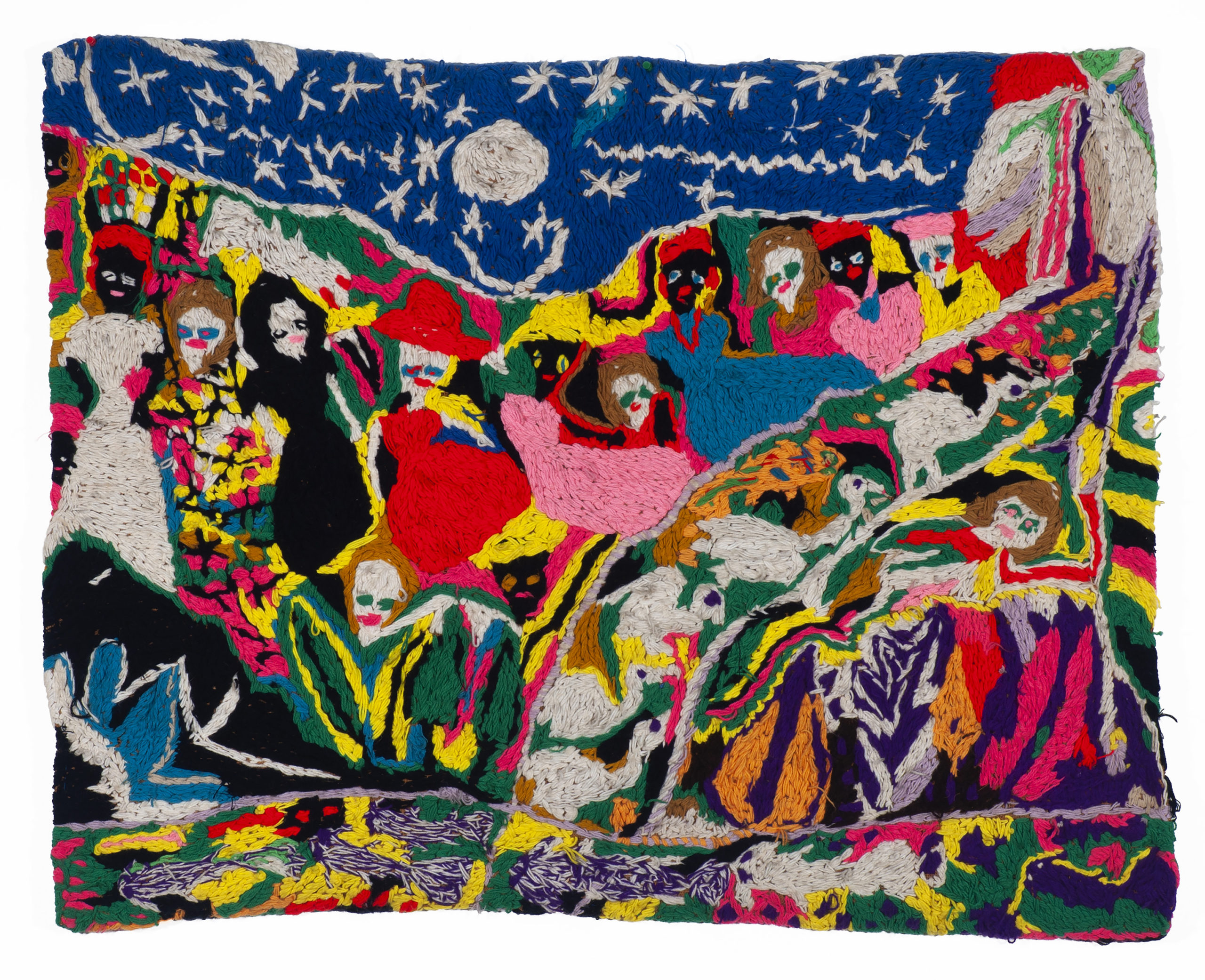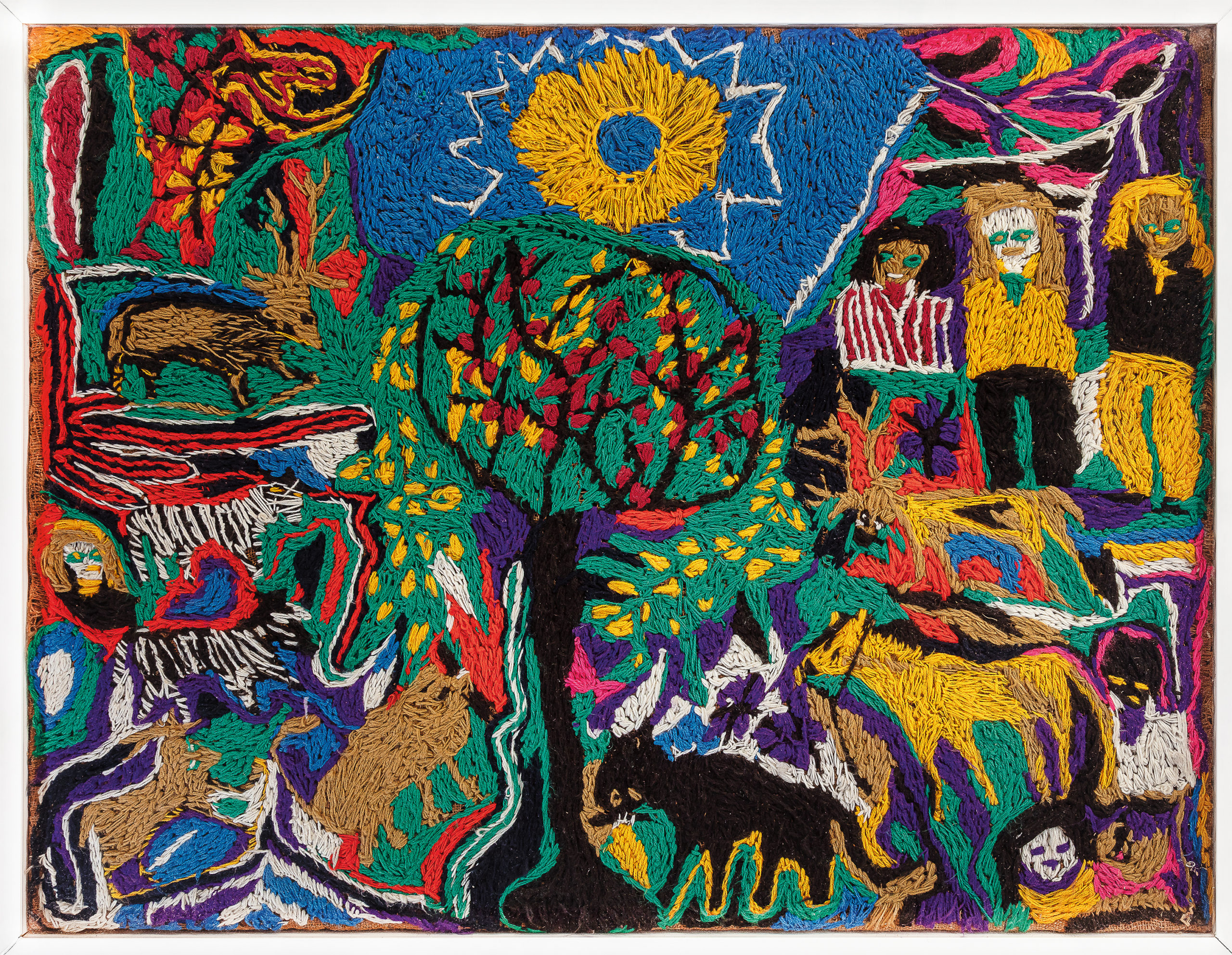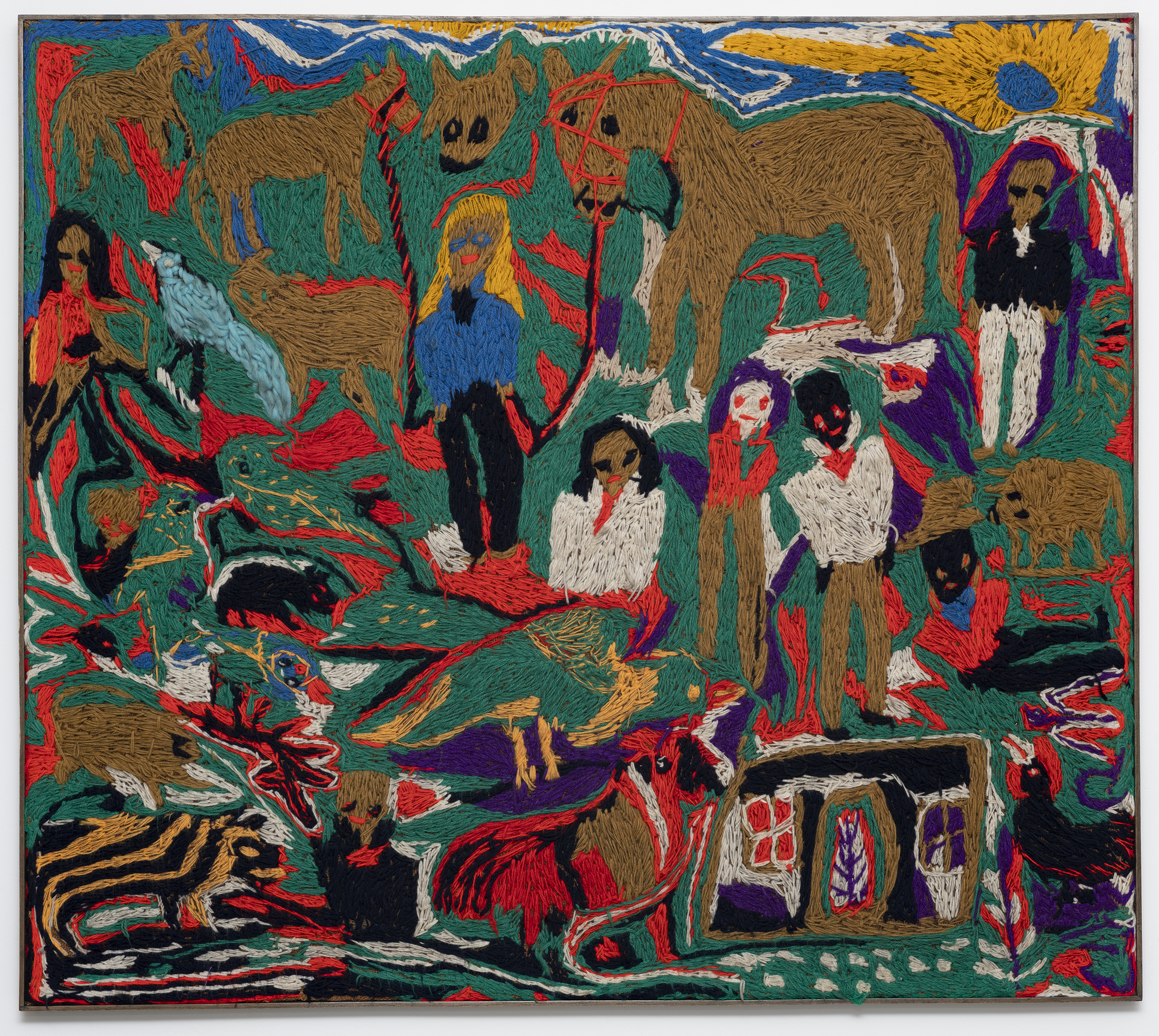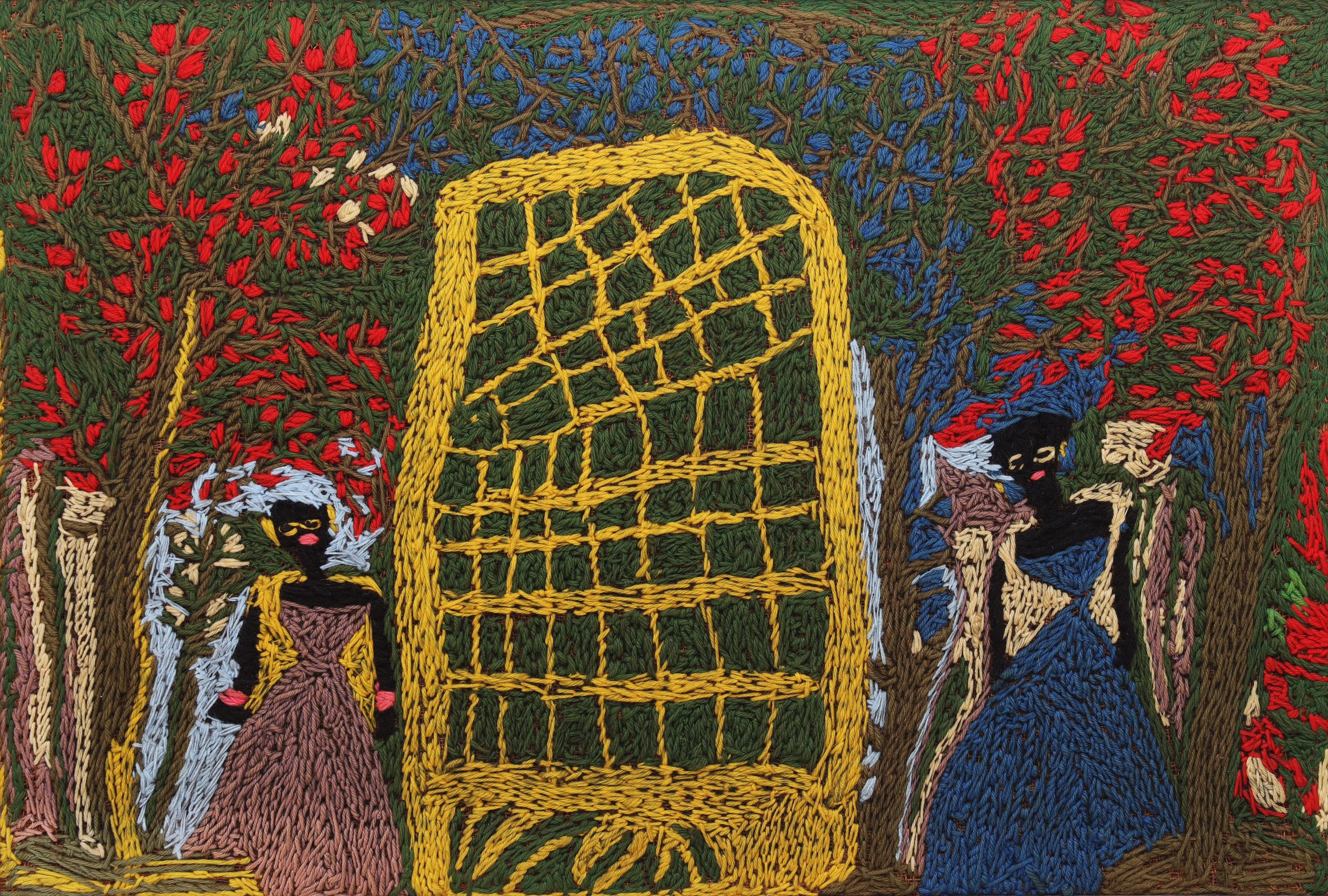Untitled, 1969–1976
Madalena Santos Reinbolt





Featuring 42 textile works and oil paintings, Madalena Santos Reinbolt: A Head Full of Planets is the first comprehensive survey of Santos Reinbolt’s art ever presented and marks the first-ever solo museum exhibition for the artist organized outside her native Brazil. Best known for her large-scale embroideries made from hundreds of vibrant colored threads, which the artist referred to as quadros de lã (“wool paintings”), the exhibition represents more than half of all known works by the artist and examines the artist’s work through a variety of lenses, including gender, race, and socio-economic dynamics.
A Head Full of Planets explores the context in which Santos Reinbolt’s artistic practice crystallized in the early 1950s, after she became a live-in cook for the architect Lota de Macedo Soares and her partner, the American poet Elizabeth Bishop, at their home in Petrópolis, a mountain getaway favored by Brazilian high society. It was not until the mid-1960s, while working in another household, that she began to dedicate herself to embroidery and would begin creating many of the works for which she is best known today.
Presented nonchronologically, A Head Full of Planets is divided into four main sections. The opening section explores the often-competing pluralities of her life as an artist, domestic worker, and Black woman, tracing her path from her younger life growing up on a small farm in rural Bahia, to her migration to the wealthier cities of the southeast seeking employment opportunities. Another section presents her body of work as a condensation of time, space, and racial dynamics, ranging from farm life to crowded city scenes, as she rendered festive celebrations, collective meals, and outdoor spaces—mountains, skies, fauna, flora—both native to Brazil and belonging to distant lands, real and imagined. The exhibition concludes with an exploration of the shared affinities of Santos Reinbolt’s embroideries with long-standing textile traditions practiced by women across Brazil, including contemporary Brazilian artists.
To honor and give voice to Santos Reinbolt, the exhibition includes recordings of Santos Reinbolt’s interviews with anthropologist and art critic Lélia Coelho Frota performed by poet, educator, and Black feminist scholar Luana Reis who, like Santos Reinbolt, was born and raised in Bahia, Brazil.
The exhibition is organized by Museu de Arte de São Paulo Assis Chateaubriand – MASP and is curated by Amanda Carneiro, Curator, MASP, and André Mesquita, Curator, MASP. The presentation at the American Folk Art Museum, New York, is curated by Valérie Rousseau, PhD, Curatorial Chair and Senior Curator of 20th-Century & Contemporary Art, with the curatorial assistance of Dylan Blau Edelstein.
EXHIBITION-RELATED PROGRAMS & RESOURCES
Friday, February 14, 2025 – Virtual Insights: Madalena Santos Reinbolt: A Head Full of Planets (online program)
Friday–Sunday, March 7–9, 2025 – A Dance For Madalena. Ana Pi Responds to the Exhibition Madalena Santos Reinbolt: A Head Full of Planets (in-person program)
Sunday, April 13, 2025 – I Can See It All Even With My Eyes Closed–A Virtual Seminar on the life and Art of Madalena Santos Reinbolt (online program)
Tuesday, May 20, 2025 – To Speak In Threads: Hellen Ascoli, Anna Burckhardt Pérez and Siu Vásquez In Conversation (online program)
Lead support is provided by the Ford Foundation. Major support is provided by The Coby Foundation, the National Endowment for the Arts, and the Madalena Santos Reinbolt Advisory Committee: LA Dillon, Vilma Eid, Ady Fong, Maria Fernanda Mazzuco, Luciana Solano. Additional support is provided by the Consulate-General of Brazil in New York / Instituto Guimarães Rosa, Citi, the Dorothea and Leo Rabkin Foundation, the New York City Department of Cultural Affairs in partnership with the City Council, the New York State Council on the Arts with the support of the Office of the Governor and the New York State Legislature, and the David Davies and Jack Weeden Fund for Exhibitions.

Madalena Santos Reinbolt, Untitled, 1969–1976. Wool on burlap, 32 7/8 x 40 1/2 in. Museu de Arte de São Paulo Assis Chateaubriand, São Paulo, Brazil, gift of Edmar Pinto Costa, 2021, MASP.11309

Madalena Santos Reinbolt, Untitled, 1965–1976. Acrylic wool on burlap, 27 x 38 in. Collection Edmar Pinto Costa, São Paulo, Brazil

Madalena Santos Reinbolt, Untitled, 1965–1976. Acrylic wool on burlap, 37 x 42 in. Collection Edmar Pinto Costa, São Paulo, Brazil

Madalena Santos Reinbolt, Untitled, 1965–1976. Acrylic wool on burlap, 34 1/4 x 43 1/4 in. Collection Edmar Pinto Costa, São Paulo, Brazil

Madalena Santos Reinbolt, Untitled, 1965–1976. Acrylic wool on burlap, 35 7/8 x 46 in. Collection Renan Quevedo, São Paulo, Brazil
Lead support is provided by the Ford Foundation. Major support is provided by The Coby Foundation, the National Endowment for the Arts, and the Madalena Santos Reinbolt Advisory Committee: LA Dillon, Vilma Eid, Ady Fong, Maria Fernanda Mazzuco, Luciana Solano. Additional support is provided by the Consulate-General of Brazil in New York / Instituto Guimarães Rosa, Citi, the Dorothea and Leo Rabkin Foundation, the New York City Department of Cultural Affairs in partnership with the City Council, the New York State Council on the Arts with the support of the Office of the Governor and the New York State Legislature, and the David Davies and Jack Weeden Fund for Exhibitions.